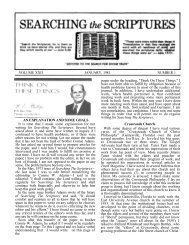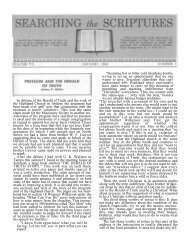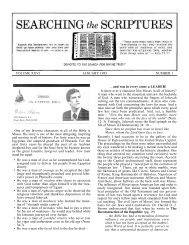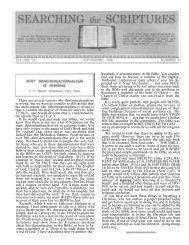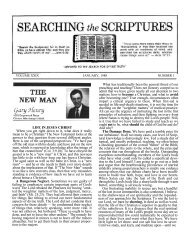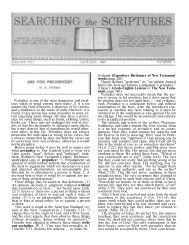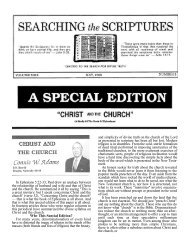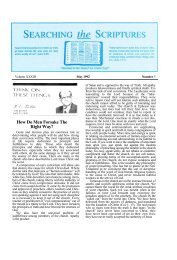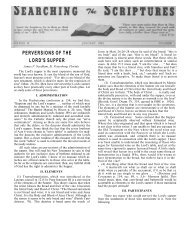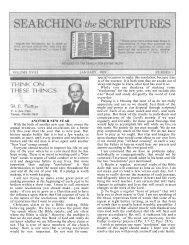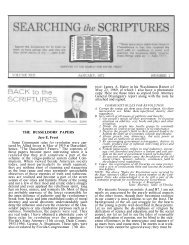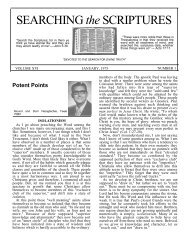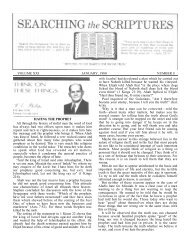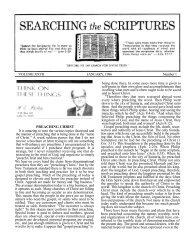Volume 31 – 1990 (PDF) - Searching The Scriptures
Volume 31 – 1990 (PDF) - Searching The Scriptures
Volume 31 – 1990 (PDF) - Searching The Scriptures
You also want an ePaper? Increase the reach of your titles
YUMPU automatically turns print PDFs into web optimized ePapers that Google loves.
Page 8<br />
I have little more to add regarding the "war question,<br />
" and other such issues. All such involve<br />
brethren in sin, according to some. Fellowship exists in<br />
regard to most of these issues in spite of such. I am<br />
unable to detect any logic or consistency in Brother<br />
Spears' comments on this. I think he has his apples<br />
and oranges all mixed up.<br />
I did not misunderstand the thrust of Dudley's<br />
statement: "If brother Green's use of Romans 14 is<br />
right, there can be no wrong position to take on anything...<br />
" I reject the notion that such is a consequence<br />
of my understanding of Romans 14.<br />
You ask, "which was the wrong party?" Why the<br />
party that maintained a distinction in foods was wrong.<br />
I do not say thy sinned by not eating meats, but they<br />
were wrong in their understanding (Mark 7: 18; Rom.<br />
14: 14; Acts 10: 14-24; 1 Tim. 4: 4), and aren't we to<br />
understand what the will of the Lord is (Eph. 5: 17)?<br />
Those who kept certain days were wrong on that<br />
question (Gal. 4: 10). I do not believe I am guilty of the<br />
judging that Paul warned against (Verses 4, 10, 13)<br />
when I conclude that one party was wrong on those<br />
issues. It is the brother who draws the line of fellowship<br />
and concludes that one party or the other stands<br />
condemned by God that is guilty of such judgment.<br />
Some seem to think that one must be right on everything<br />
to have any hope of salvation. I venture we had<br />
all better hope that such is not the case.<br />
Dudley is especially concerned over whether I believe<br />
God might accept some who are in adulterous<br />
marriages. To give a specific example, what about the<br />
woman I referred to in my previous article whose<br />
parents annulled her marriage when she was a youngster<br />
and who is now remarried. Is she living in adultery?<br />
I don't know for sure. But why don't we just let the<br />
Lord do the judging on such matters (Rom. 14: 10-12).<br />
Is that a hypothetical case? No, she's a real person in a<br />
real situation and it's my conviction that we had best<br />
leave such questions to those involved and to God.<br />
<strong>The</strong> letters I have received from brethren ready to<br />
draw lines on practically every disagreement prove<br />
little to Dudley. Well they prove to me that if we<br />
maintain our present course we are going to splinter<br />
into several dozen factions over questions of personal<br />
application. Dudley refers to such issues as "unrevealed<br />
matters. " <strong>The</strong>re is at least some revelation on<br />
most all questions that arise; and fully as much or more<br />
on some of them (the war question, for example) as on<br />
the divorce — remarriage controversy.<br />
FELLOWSHIP:<br />
NO RIGHT TO BE WRONG<br />
DIVINE MESSAGE: "<strong>The</strong>refore I said to you that you<br />
will die in your sins; for if you do not believe that I am He,<br />
you will die in your sins" (John 8: 24).<br />
In the midst of controversy, the Christian should first<br />
go back to basic indisputable principles. By doing so, he<br />
will help insure that the foundation upon which he establishes<br />
current positions is sound.<br />
It seems that all of us are grappling with difficult<br />
applications of God's teaching regarding "FELLOW-<br />
SHIP. " <strong>The</strong>se are certainly not new issues but in dealing<br />
with them some seem to be forgetting ancient Bible<br />
principles. I would like to say "up front" that wisdom,<br />
study, patience, and love must be involved anytime we<br />
talk about fellowshipping or disfellowshipping. Whatever<br />
we do, however, must be done within the context of certain<br />
truths taught by Christ and His apostles. One such<br />
principle is that when essential truth is involved, we<br />
have no right to be wrong. I am certainly aware that<br />
on most of today's topics there is disagreement over what<br />
is "essential" to believe and/or practice, but many are<br />
making sounds which imitate denominational preachers<br />
who teach that what one believes or practices on any Bible<br />
doctrine should be tolerated if he is generally pious or<br />
usually sound in teaching. <strong>The</strong> charitable position, they<br />
say, recognizes that "there is much good in every faith"<br />
and that "we all differ. " To fail to recognize "believers" for<br />
fellowship is bigoted, intolerant, uncharitable, and even<br />
un-American.<br />
This notion grew out of the Reformation period when<br />
men were given Bibles and told they should read them.<br />
Instead, however, Luther, Zwingli, Calvin, and others<br />
formulated systematic written creeds upon which others<br />
established faith. When creeds did not agree, many came<br />
to justify holding differing beliefs on matters of Bible<br />
doctrine concluding that everyone can be right from his<br />
own viewpoint.<br />
Now if one is to believe that all religious beliefs are<br />
right, he is logically forced to believe that there is no error<br />
being taught anywhere. Jesus said, "Beware of false<br />
prophets, who come to you in sheep's clothing, but inwardly<br />
they are ravenous wolves" (Matt. 7: 15). Peter<br />
taught, "there were also false prophets among the people,<br />
even as there will be false teachers among you, who will<br />
secretly bring in destructive heresies, even denying the<br />
Lord who bought them, and bring on themselves swift



